
It’s July, a month were the United States celebrates its independence with explosions! But what would life look like with the opposite of freedom? Or perhaps too much freedom? Or freedom in the wrong things? What happens when the villains’ plans for world domination work? And how could they have done a better job spreading their…benevolent dictatorship over the world?
Dystopian movies, books, etc explore these questions. Have you noticed the uptick in grimdark, post apocalyptic, hopeless movies lately? In the 1940s, war and humor movies dominated. The public wanted to either see us winning or to forget we were in a war at all. In the 50s and 60s, Hollywood gave us visions of sci-fi utopia. The 70s ushered in a swing toward “real-life” movies that could’ve cut 3 hours from their run time and actually improved. The 80s…let’s not go there. The 90s embraced families as a marketing target and used the new special effects technology to cater to them. The early 2000s saw on the one hand, superhero movies. On the other hand, it saw the rise of dystopian themes. In the 2010s we’re all about the undead, be it vampires or zombies. Mainly zombies. But zombies are a topic for another post.
People have seen that the promises of the 50s fell through. There is no utopia. There’s magical technology that is beyond anything our grandparents dreamed of, but what’s it brought us? There’s more war, violence, and unrest now than ever. There’s loss of connection among people. Our lives are complicated; our free time is non existent. You can’t trust anyone. People are popping anti anxiety and pain pills like they’re Skittles, then wandering through life like zombies.
We’re going to look at a few dystopian movies today and answer the questions we asked earlier. Most of the titles are from the 2000s, but a few are classics from earlier years. Ready?
Onward!
Mad Max Beyond Thunderdome
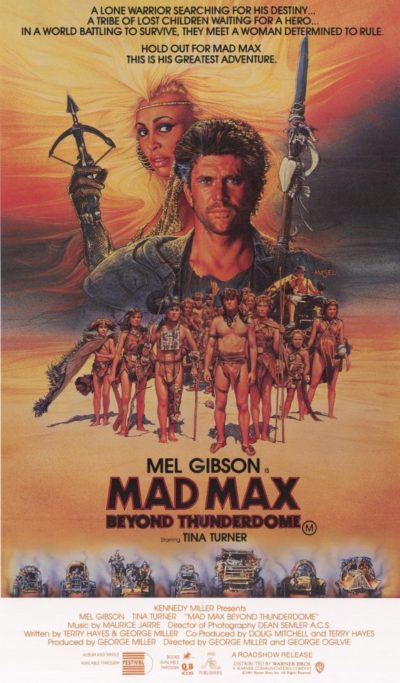
Oldie but a goodie! Mad Max is arguable one of the biggest names in post-apocalyptic, dystopian movies. Who doesn’t like car chases through deserts, armor on everything, and a general feeling of hopelessness?
Summary/synopsis: In this episode of the Mad Max franchise, we meet Aunty Entity, founder and leader of Bartertown. The town runs on a pig-doodoo fueled methane refinery. A dwarf, Master, and his giant bodyguard, Blaster, run the facility. Master’s got his sights on Bartertown’s moth-eaten Lay Z Boy throne. Solution? Have Max kill Blaster in a gladiatorial duel in the Thunderdome.
While scouting the refinery, Max befriends a slave who tells him Blaster’s weakness: high-pitched noises.
When Max defeats Blaster via said weakness, Max discovers the bodyguard is developmentally delayed. Max won’t kill him. When Master discovers this was a plot to kill his guard, he threatens to shut down the refinery. Aunty responds by killing Blaster, locking up Master, and exiling Max.
Max survives, shockingly, and goes on to befriend and be-enemy others. Some of this friends lead him to go back into Bartertown and free Master and destroy the methane refinery. Aunty doesn’t take kindly to this. Cue action and fight scenes with an airplane and desert raiders. At the end, Max is at her mercy. But she doesn’t kill him, cuz he’s the hero. No, wait, it’s because she “respects” him.
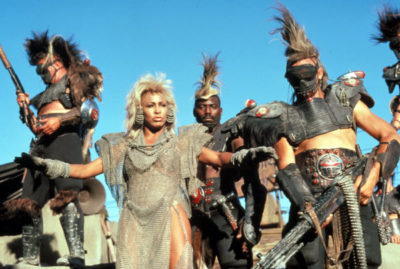
Inciting event: Nuclear war
Dystopian world structure: City states, as far as we know, are the main form of civilization. If you’re not down with living at the mercy of whoever managed to claw their way to the top of the power ladder, you have two choices: join a gang or go lone wolf. Gangs can be crazier than towns. Lone-wolf status makes you a target.
Freedoms: Killing people, forming your own dictatorship, running methane refineries not up to code, speeding, running gladiator competitions. Pretty much anything except freedom from fear.
Origin of dystopian rulership: The need for stability in a chaotic world. Aunty and Master rigged up a semi-sustainable civilization upon a foundation of pig crap. Both people were cunning enough to come to power by ways other than their own brute strength. Not an easy feat in a world without equal opportunity laws.
Pro tips for dystopian dictatorships:
Don’t get an unknown quantity to perform a vital service for you. Who knows what his morals are?
Slaves are tempting, I know, but they’re a bad idea. They don’t like you. If you do go in for them, keep them ignorant of everything.
Exile = hero boomerang. Kill them! Don’t just send them off to an uncertain end.
Fixes: The biggest problem in a splintered society is forming alliances. Villages/city states/militias have their own power and independence, albeit all is limited. Why do you think the USA had such trouble uniting the colonies? Nobody wants to bow to or trust another. There are a few ways to unite people: force, bribes, enemies, fortune, leadership. You’d need a modern Bluetooth – the barbarian not the technology. You’d also need the right leaders. There’s no working with some people.
The best, longest-lasting way to unite people is to have them working toward a common goal. Of course, you’ll always have the power-hungry idiot who tries to take over. But that’s when the people have to stand up.
The Postman
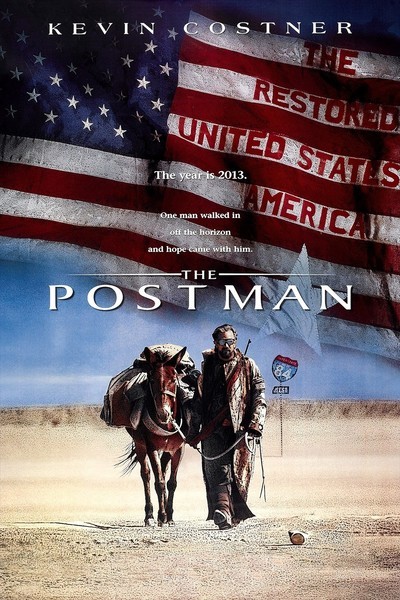
It’s the far off year of 2013, after “The Doomwar” annihilates technology. This classic is as dreary as it is long.
Summary/synopsis: A local militia shanghais a nomad, pressing him into the service of General Bethlehem, who runs the Holnists. The nomad escapes eventually and hides in an old mail truck. He gets the brilliant idea to impersonate a government employee and tell the next town over that the US gov’t is back in biz. They must be really desperate if they take this as good news!
The village people give him mail. Yay.
General Bethlehem believes the gov’t story and responds like any sane person would: he attacks the town the Postman’s in, kills people, burns things, and captures the Postman.
Postman escapes with a little help from his friends, then learns the postal service is up and running, as much as it ever was anyway, thanks to a boy he inspired with tales of slow deliveries, 9-5 hours, government pensions, and no Sunday service.
Bethlehem fights the postal service, which is mainly staffed by teens instead of surly Baby Boomers. Postman tries to call it off, but like all gov’t agencies, the postal service has spread beyond his control.
Eventually things come to a head. Postman challenges Bethlehem for Holnist leadership, one on one, rather than having all-out war. The Postman is the victor but gives Bethlehem a chance to build a new world. Ever the clear thinker, Bethlehem goes to shoot the Postman – and is shot dead by his former first officer.
Inciting event: “The Doomwar” annihilates technology. I’m assuming it’s an EMP? They never say.
Dystopian world structure: It’s the semi-dark ages again, thanks to the warring factions and general chaos. It’s hard to concentrate on getting the internet working again when some warlord is about to cut off your hands. Villages are your permanent establishments. Your other options are militias, which follow warlords. They’re glorified gangs who prey on the average citizen. Horses are dollars. Wallets are obsolete.
Freedoms: Killing people, forming your own militia, kidnapping, impersonating a government employee, establishing your own mail service.
Origin of dystopian rulership: The need for stability in a chaotic world. Force of arms and the threat of death work wonders for imposing iron-strong order.
Pro tips for dystopian dictatorships:
Conscription is a bad idea. In post-Doomwar Oregon, your soldiers kill you!
Check the facts before you believe a government agency.
Don’t burn towns. They’re how you get money!
Don’t run rampant all over the countryside. You don’t need more enemies.
If you’re beat and the hero offers you a chance, take a page from Sauron’s book and join him. Stab him in the back later, after he does your work for you.
Fixes: It takes a lot of resources and effort to stay on top by intimidation/force alone. Just ask Rome. Oh, you can’t because it fell because it tried to do the above. A little threat goes a long way. Also, if you’re going to deal with an enemy, do a good job of it. No capturing, only killing.
The best way to keep people loyal is to keep them happy. It might also help to make them rely on you. Make their lives so that their options if they ditch you are less appealing than the status quo.
Equilibrium
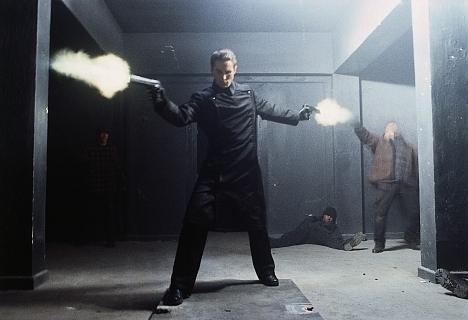
Christian Bale in slick uniforms and gunslinging? What’s not to like about this movie!
Summary/synopsis: John Preston is a top Cleric (SS officer, basically). The gov’t killed his wife, as she refused to take the Prozium med that keeps people from feeling emotions. Preston also lost his partner Partridge – by executing him because Partridge took a book of poems instead of handing it over as evidence. Partridge wanted to feel again.
Preston accidentally breaks his vial of Prozium but doesn’t have time to get a replacement that day. While on a raid, he feels emotion. After this taste of freedom, he skips more doses.
Later, Preston’s new partner Brandt is surprised when Preston prevents him from executing a “Sense Offender” (someone who won’t take the Prozium), Mary.
Feelings of remorse over killing Partridge and also a love for Mary develop in Preston. Eventually he meets Jurgen, the Underground’s leader. Together they plan the assassination of Father, leader of the government. Somehow that’s always a solution, because there’s no way the corruption could’ve spread! Hah.
Meanwhile, the Clerics seem to have caught on to Preston. They tell him someone inside the ranks is a traitor…but then they let him go in order to track down the Underground’s leadership.
Jurgen allows some leaders to be captured and also tells Preston not to go to the execution of Mary. Preston doesn’t listen, instead trying to stop the funeral. He’s accused of being a traitor, but he manages to trick the Vice Counsel into believing Brandt is the actual traitor.
Preston then turns in the resistance leaders. Father grants him an exclusive audience. Preston plans to use this as his chance to kill Father, but he discovers that Brandt isn’t arrested and was part of a plan to expose Preston. The Vice Counsel is also a surprise: he’s masquerading as Father after the original man died. Guess what? He doesn’t take Prozium either. Rather a good idea I guess.
Cue fight scene with a gun kata allowing Preston to dodge bullets and kill guards. He kills the Vice Counsel, even after the man grovels. The Underground destroys the Prozium manufacturing plant and sends the revolution into high gear.
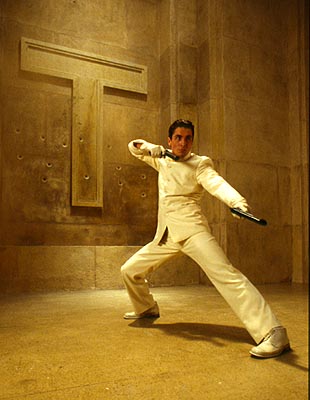
Inciting event: World War III
Dystopian world structure: Welcome to Libria, where Tetragrammaton Council with Father its leader is god and nobody cares. Why? The government requires them to take Prozium. The drug eliminates emotion, because the government decided emotion causes war and strife. If you don’t take it, they kill you. Simple. It’s a fairly safe life if you don’t cross the Grammaton Clerics, who are law enforcement with Matrix-like skills with firearms thanks to the Gun Katas. An underground is growing, however, as some people want to feel emotion again.
Freedoms: Feel no remorse, act with pure reason, report your neighbors for not taking meds, take mind-altering meds, execute prisoners on the spot if you’re a cleric. Freedom from emotions, including joy and happiness.
Origin of dystopian rulership: The need for stability in a chaotic world. Like Bhudism, which believes desires are the source of pain, the Tetragrammaton tries to eliminate the source of pain. We don’t want another war, right? So sacrifice freedom for safety.
Pro tips for dystopian dictatorships:
If you really want someone out of the way, just kill them. While destroying them in public seems fun, it’s a lot of trouble and can backfire.
Don’t reveal everything! Stop monologue-ing.
Don’t turn your best Clerics against you.
Be careful how you handle uprisings. Most grow when you try to stamp them out.
Fixes: For the love of sanity, don’t rely on people to take a med! Even if you threaten them with death, they won’t. In fact, that’ll probably make them more apt to skip it, since they want to see what happens. Instead, put it in the food and water and air. Even better, genetically modify them to not feel. Remember Brave New World and its vial babies?
People will always feel. A lot of times those feelings don’t accurately reflect reality, but that’ll never stop them. If you learn how to use those feelings, you can swing with the current of human loyalty and love instead of against it.
V for Vendetta
Masks and explosions. Nuff said.

Summary/synopsis: Vigilante V, who wears a Guy-Fawkes mask as his signature, stands against the police state. He rescues a reporter from being arrested as she’s out past curfew. He takes her to watch the product of his hard work: the destruction of a court building. He then takes responsibility for the destruction by hacking into the TV feed. Using this time to encourage the citizens to rise up, he then tells the Gov’t to meet him on Guy Fawkes day outside the House of Parliament.
The cops burst in, but the reporter helps him escape. She winds up knocked out. V takes her home, telling her she must stay with him for a year. Um, ok. Then he kills the chief propagandist and the Bishop of London. The reporter, Evey, offers to help. During her “helping,” she escapes to a friend’s house. Said friend is part of the resistance and even performs satire of the gov’t on his TV show. Not smart. Cops raid. Evey’s captured. They torture her for info on V.
They threaten to kill her if she doesn’t talk. She says she’d rather die than give him away. Then the curtain’s pulled away and we find that V was actually the one who captured and tortured her. But for a good cause! Namely, to free her from her fears and make her a stronger person. Um, ok, crazy masked man. I’m not sure it works that way. Hannibal actually knew how to do this, no torture needed.
We learn that V is the result of human experimentation. He’s now killing his experimenters. The research went on at a concentration camp on undesirables. Its result? The virus that caused the pandemic. The Norsefire Party released it in order to create an environment of chaos in which they could seize power.
V goes on a massive PR campaign, handing out Guy Fawkes masks to everyone. Unrest grows. On Nov 4th, Evey visits V, who shows her the train he plans to use to blow up Parliament. He gives her the choice to use it or not. Um, ok. V has made a deal or two with one of the political leaders, but after the leader holds up his end of the deal (killing another politician), V breaks the contract and kills him. Cue fight. V is mortally wounded.
Evey gives him a Viking funeral by putting him on the train and sending it to Parliament. Boom.
This leaves the military order-less, and they allow the civilians to pass. The tyrants have fallen.

Inciting event: Pandemic and civil war
Dystopian world structure: A fascist police state replaces the UK’s parliament. The Norsefire Party is its ruler, and they rule with an iron fist. Concentration camps for undesireables, secret police called Fingermen, curfews, propaganda… They do totalitarianism right!
Freedoms: if you’re with the Party, you can… Turn people in, experiment on people, imprison people, and terrorize citizens. If you’re not, you’re just SOL.
Origin of dystopian rulership:
The need for stability in a chaotic world. The Norsefire Party believed they were what the world needed. Plus…they really wanted power.
Don’t let the people become restless.
Make sure your test subjects don’t escape.
Stamping down and ridiculing unrest doesn’t work.
Don’t tell your backstory to people!
Fixes: Generally, the harder you hold to rule, the more irritated people become. It’s far better to fatten and weaken them with pleasures than force them to serve you. Bread and circuses work better than beatings and curfews. Letting people be ruled by their pleasure is quite easy. Just say it’s fine, and give them their desires. Make them dependent.
If outrage appears, use distraction. A hot-button issue blown out of proportion is a sure way to get people to forget what they were mad about. Most people have the attention span of a gnat anyway when it comes to fighting for a cause.
Unless you go to an third world country, odds are you’ll never be in or rule a dystopian world. But when you see the tactics and the failure of the villains here, you’ll be well equipped to avoid being taken advantage of in our first world society.
Further reading:
Villainous independence: More than fireworks
Villainous Resilience: 15 Ways to bounce back like the Joker
How to be Villainously Positive: 18 ways with the Joker
Villainous opportunism: How to take advantage of every opportunity, Albert Wesker-style
Agree? Disagree? Let us know in the comments.
Perform your own villain assessments with the Villain Matrix. Use the Villain Matrix spreadsheet that comes free when you join the Research Team, where you’ll also get our newsletter with its exclusive updates and content.